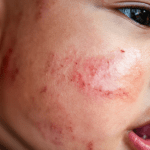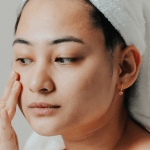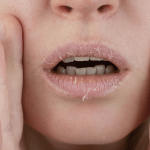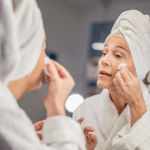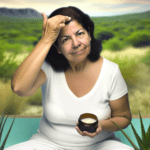Understanding Eczema in the Context of Menopause
Eczema, also known as atopic dermatitis, is a chronic skin condition characterized by dry, itchy, and inflamed skin. It is a prevalent condition that affects individuals of all ages, with a significant number of cases persisting into or re-emerging during adulthood. The exact cause of eczema is not fully understood, but it is believed to involve a combination of genetic and environmental factors, and it often occurs in individuals with a family history of the condition.
The Impact of Hormonal Changes on Skin Health
Hormonal fluctuations throughout a woman’s life, particularly during menopause, can have profound effects on skin health. Menopause, which typically occurs between the ages of 45 and 55, leads to a decrease in estrogen levels. This hormonal shift can result in a variety of skin changes, including dryness, thinning, and increased sensitivity, creating an environment that may exacerbate eczema symptoms.
Estrogen’s Role in Skin Physiology
Estrogen plays a crucial role in maintaining skin health. It influences skin thickness, wrinkle formation, and moisture levels. Estrogen receptors are found throughout the skin, with the highest density in the face, genital region, and legs. As estrogen levels decline during menopause, the skin’s ability to retain moisture diminishes, leading to dryness and potentially contributing to the severity of eczema flare-ups.
Menopause: A Transition Beyond Menses
Menopause is not merely the cessation of menstruation but a complex transition that affects various aspects of a woman’s health, including her skin. The hypoestrogenic state of menopause has implications for the structure and function of the skin. As many as 64% of women attending menopause clinics report skin problems, with eczema being a common concern. The reduction in estrogen levels is associated with a decrease in dermal collagen, thinning of the skin, and an increase in transepidermal water loss (TEWL), all of which can aggravate eczema symptoms.
Understanding the relationship between menopause and eczema is essential for managing the condition effectively. Women experiencing menopause may notice a change in the severity or frequency of their eczema flare-ups, and it is important to recognize that this could be a result of the hormonal changes occurring in their bodies. By acknowledging the connection between menopause and eczema, individuals and healthcare providers can better tailor treatment strategies to manage the condition during this stage of life.
Symptoms and Co-Occurring Conditions
Identifying Eczema Symptoms
Eczema, also known as atopic dermatitis, is characterized by patches of itchy, inflamed skin. The appearance of eczema can vary widely among individuals and can present as redness in lighter skin tones and as a range of hues from gray to purple-brown in darker skin. Common symptoms include:
- Rough, scaly skin
- Persistent dryness
- Intense itching, which may worsen at night
- Oozing or crusting in severe cases
Recognizing Menopausal Symptoms
Menopause marks the end of a woman’s reproductive years and brings a host of symptoms due to hormonal fluctuations. These symptoms often include:
- Hot flashes and night sweats
- Headaches and joint pain
- Fatigue and sleep disturbances
- Mood swings, depression, and irritability
- Decreased libido
Skin Changes During Perimenopause
During perimenopause, the phase leading up to menopause, estrogen levels begin to decline. This hormonal shift can manifest in various skin changes, such as:
- Increased dryness and sensitivity
- More pronounced wrinkles and sagging
- Development of rashes and easy bruising
- Acne and facial hair growth
- Slower wound healing
These changes can exacerbate existing skin conditions like eczema, making management more challenging.
Collagen Loss and Skin Elasticity
Collagen, a vital protein for skin strength and elasticity, diminishes significantly during menopause. It’s estimated that women’s skin loses about 30% of its collagen within the first five years of menopause, followed by an annual loss of 2% over the subsequent two decades. This reduction in collagen leads to:
- Increased skin laxity and the formation of wrinkles
- Thinning of the skin, making it more prone to damage
- Decreased resilience and ability to retain moisture
These factors contribute to the heightened visibility of eczema symptoms and the need for targeted skin care strategies during and after the menopausal transition.
Lifestyle and Home Remedies for Managing Eczema
Stress Management Techniques
Stress is a well-known trigger for eczema flare-ups, and managing stress can be a powerful tool in controlling this skin condition. Techniques such as deep breathing exercises, mindfulness meditation, and gentle yoga can help calm the mind and reduce stress. Additionally, engaging in enjoyable activities like hobbies or spending time in nature can also promote relaxation and improve overall well-being.
Choosing Skin-Friendly Products
When dealing with eczema, it’s crucial to select skin care products that are gentle and designed to minimize irritation. Look for fragrance-free and hypoallergenic products, as fragrances and certain chemicals can exacerbate eczema symptoms. Ingredients such as urea, glycerin, and hyaluronic acid are beneficial as they help to retain moisture and repair the skin barrier. Avoid products containing alcohol, lanolin, and harsh preservatives, which can dry out and irritate sensitive skin.
Shower Habits and Skin Care
Hot water can strip the skin of its natural oils, leading to dryness and irritation. Opt for lukewarm showers and keep them brief to prevent exacerbating eczema. After showering, gently pat the skin dry with a soft towel and apply a water-free, chemical-free moisturizer like Bette from Damiva while the skin is still damp to lock in moisture. Consider using a humidifier in dry environments to maintain skin hydration.
Dietary Considerations for Skin Health
A balanced diet rich in omega-3 fatty acids, zinc, and vitamin C can support skin health and potentially reduce eczema symptoms. Foods such as fatty fish, seeds, nuts, and leafy greens are excellent choices. Staying hydrated is also essential for maintaining skin moisture, so aim to drink plenty of water throughout the day. Some individuals may find that certain foods trigger their eczema; keeping a food diary can help identify potential dietary irritants to avoid.
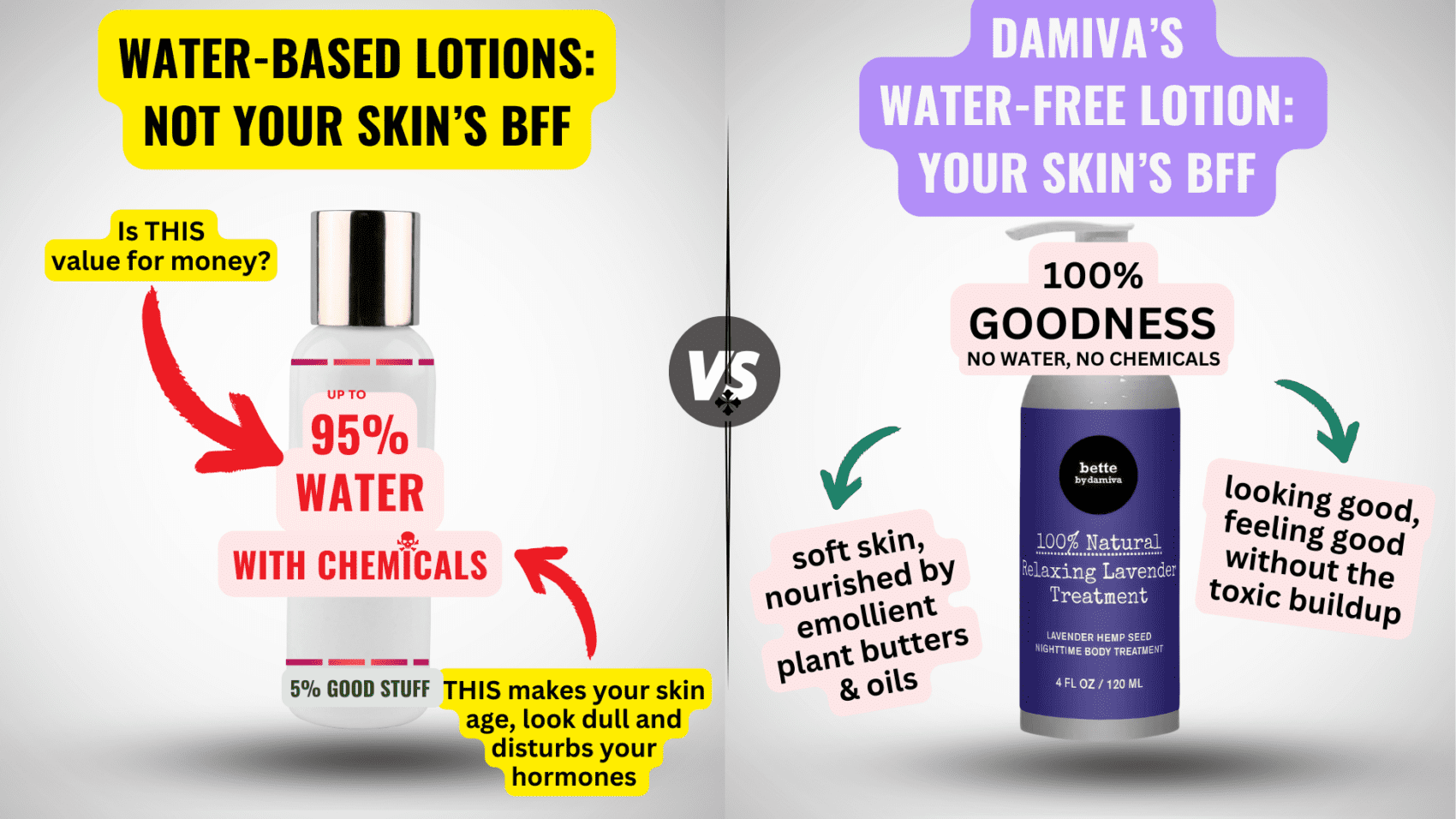
THEN IT CONTAINS TOXIC CHEMICALS. WHY RISK IT GETTING SICK? GO CHEMICAL FREE.
Medical Treatments for Eczema During Menopause
The Role of Emollients and Moisturizers
Emollients and moisturizers are cornerstone treatments for managing eczema during menopause. These products work by hydrating the skin and forming a protective barrier to prevent moisture loss. Over-the-counter (OTC) emollients are widely available, but for severe cases, prescription-strength emollients may be necessary. Ointments, which are greasier, are particularly beneficial for very dry skin. It is crucial to select products free from chemicals and other irritants such as fragrance, perfume, or lanolin, which can exacerbate sensitive skin. Best is to use a product with emollient plant butters and oils like the products by Damiva.
Corticosteroids and Anti-Inflammatory Options
Topical corticosteroids are an effective anti-inflammatory treatment for inflamed eczema. They come in various strengths, and while mild forms are available OTC, more potent steroids require a prescription. If there is no improvement after two weeks of use, it is advisable to consult a doctor for alternative treatments or to check for infection. It’s important to use these treatments as directed to avoid potential side effects, such as skin thinning.
Prescription Medications and Topical Treatments
When OTC options are insufficient, prescription medications may be necessary. Topical calcineurin inhibitors, such as pimecrolimus and tacrolimus, are non-steroidal treatments that can help maintain skin health after an eczema flare has been controlled. Other options include phosphodiesterase inhibitors like crisaborole, which reduce inflammation. For those over age 12, ruxolitinib is an approved treatment for mild to moderate eczema. It is essential to test new products on a small area of skin without eczema to ensure there is no adverse reaction.
Biologics and Advanced Therapies
For severe eczema that covers large areas of the body or does not respond to other treatments, biologics and advanced therapies may be considered. Biologics like dupilumab and tralokinumab target specific parts of the immune system to reduce inflammation. Janus kinase (JAK) inhibitors, such as upadacitinib and abrocitinib, are oral medications that can also be used in conjunction with topical treatments. These advanced therapies are typically prescribed by a dermatologist and require careful monitoring for potential side effects.
In conclusion, a variety of medical treatments are available to manage eczema during menopause. It is important to work with healthcare professionals to develop an individualized treatment plan that addresses both the severity of the eczema and the unique skin changes that occur during this life stage.
Navigating Healthcare: Gynecology and Dermatology
When to Consult a Dermatologist
If you are experiencing persistent skin issues such as redness, itching, or dryness that you suspect may be eczema, it may be time to consult a dermatologist. Dermatologists specialize in skin conditions and can provide a definitive diagnosis and tailored treatment plan. Signs that warrant a visit to a dermatologist include:
- Severe or persistent eczema symptoms that do not improve with over-the-counter treatments
- Recurring skin infections or open sores
- Significant impact on quality of life, including sleep disturbances and emotional distress
- Concerns about skin changes that could indicate a more serious condition
When to Consult a Gynecologist
Menopause can bring about various systemic changes, including those affecting the skin. A gynecologist can help manage menopausal symptoms and offer guidance on how these changes may impact your skin health. Consider scheduling an appointment with a gynecologist if you experience:
- Irregular periods or other menstrual changes indicative of perimenopause
- Menopausal symptoms such as hot flashes, night sweats, or vaginal dryness
- Concerns about the effects of menopause on overall health, including skin condition
- Interest in exploring hormone replacement therapy (HRT) or other treatments to alleviate menopausal symptoms
The Potential of Hormone Replacement Therapy
Hormone Replacement Therapy (HRT) can be a valuable treatment for managing menopausal symptoms, including those affecting the skin. Estrogen plays a crucial role in maintaining skin health, and its decline during menopause can lead to dryness, thinning, and increased sensitivity. HRT aims to replenish these hormones, potentially improving skin condition. However, HRT is not suitable for everyone and comes with its own risks and benefits. It is important to discuss with your healthcare provider whether HRT is an appropriate option for you, considering factors such as:
- Personal and family medical history
- Severity of menopausal symptoms
- Risks, including the potential for increased risk of certain cancers and cardiovascular events
- Other available treatments and lifestyle changes that may help manage symptoms
Remember, the decision to pursue HRT should be made in collaboration with your healthcare provider, taking into account your individual health profile and treatment goals.
Do you know the three main ways that your body gets in touch with harmful chemicals with everyday products? Knowledge is Power!
The Ultimate Detox Guide will tell you how to lower your exposure to harmful chemicals!

Preventive Measures and Long-Term Skin Care
Sun Protection and Skin Cancer Screening
Protecting the skin from the sun is a critical step in preventing skin damage and cancer, especially for individuals with eczema who may have sensitive skin. Applying a broad-spectrum sunscreen with an SPF of 30 or higher is essential before going outdoors, even on cloudy days. Sunscreens should be reapplied every two hours or after swimming or sweating. Additionally, wearing protective clothing, such as long-sleeved shirts, pants, and wide-brimmed hats, can provide an extra layer of defense against harmful UV rays.
Regular skin cancer screenings are also vital. Individuals should self-examine their skin monthly for any new or changing moles, spots, or lesions and report these to a dermatologist promptly. A professional skin exam should be part of an annual health check-up, especially for those with a history of eczema or extensive sun exposure.
Routine Check-Ups and Monitoring Skin Changes
Regular check-ups with a dermatologist can help monitor skin changes and manage eczema effectively. During these visits, the dermatologist can assess the skin’s condition, track the progress of existing treatments, and adjust the care plan as needed. It’s important for individuals to be proactive in reporting any new symptoms or flare-ups since timely intervention can prevent complications.
Monitoring skin changes is not only about managing eczema but also about being vigilant for signs of skin aging, such as increased wrinkles, loss of elasticity, and changes in pigmentation. These changes can be more pronounced during and after menopause due to hormonal fluctuations affecting skin health.
Lifestyle Adjustments for Skin Preservation
Lifestyle adjustments can play a significant role in preserving skin health and preventing eczema flare-ups. Stress management techniques, such as mindfulness, yoga, and regular exercise, can reduce the likelihood of stress-induced eczema. Additionally, maintaining a balanced diet rich in omega-3 fatty acids, antioxidants, and vitamins can support skin health from the inside out.
Choosing skin-friendly fabrics, such as 100% cotton or silk, can minimize irritation and allow the skin to breathe. It’s also advisable to use fragrance-free and dye-free detergents for washing clothes, bedding, and towels. Keeping the home environment humidified, particularly during dry winter months, can help maintain skin hydration and prevent dryness.
Finally, staying hydrated by drinking plenty of water is essential for overall health and can help keep the skin supple and less prone to eczema flare-ups.
Remember: While there is no cure for eczema, these preventive measures can help manage symptoms and improve the quality of life for those affected by eczema before, during, and after menopause.
By the way, something for you, a little gift!!!
I am just in the middle of publishing my book. It’s about How women can balance their hormones. One part is about food and diet, of course.
Follow this link and enter your email.
I will send you this part of the book for free once the book is published. It has many concrete, practical tips and recipes and will help you feel better during menopause or times of Big hormonal fluctuations.
Annette, Damiva Lead for Health & Wellness

Frequently Asked Questions
Onset of Eczema in Later Adulthood
It is not uncommon for adults to experience the onset of eczema after the age of 50. As the skin undergoes changes due to aging and hormonal fluctuations, particularly during menopause, it becomes more susceptible to dryness and irritation. These conditions can trigger or exacerbate eczema. The decrease in estrogen levels, which plays a crucial role in maintaining skin hydration and elasticity, contributes to the skin’s diminished ability to retain moisture and protect against irritants and allergens. Therefore, it is important for individuals experiencing eczema symptoms in later adulthood to seek guidance from a healthcare provider to manage the condition effectively.
Duration of Eczema Post-Menopause
Post-menopause, the body continues to experience low levels of estrogen, which means that the skin remains thinner, drier, and more prone to eczema flare-ups. While menopause itself does not cure eczema, treatments are available to help manage symptoms. It is essential to maintain a consistent skincare routine, including the use of emollients and, if necessary, prescribed medications. The duration of eczema post-menopause can vary widely among individuals, and ongoing management with the help of a healthcare provider is recommended to ensure the best possible outcomes for skin health.
Dietary Tips for Eczema and Menopause
Diet can play a significant role in managing both eczema and menopausal symptoms. Here are some dietary tips that may help:
- Stay Hydrated: Drink plenty of water throughout the day to keep the skin hydrated from the inside out.
- Healthy Fats: Include sources of omega-3 fatty acids, such as fish, flaxseeds, and walnuts, which can help reduce inflammation.
- Antioxidant-Rich Foods: Consume fruits and vegetables high in antioxidants and vitamin C to support skin health and collagen production.
- Avoid Inflammatory Foods: Limit intake of red meat, gluten, shellfish, citrus fruits, cow’s milk, and dairy products, as these can exacerbate inflammation associated with eczema.
- Zinc and Protein: Ensure adequate intake of zinc and protein, which are vital for skin repair and health.
It’s important to note that individual responses to dietary changes can vary, so it may be helpful to work with a nutritionist or healthcare provider to tailor dietary choices to your specific needs.




